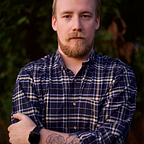The Problem of Evil is the Problem of Me
I recently got into a long discussion with a random Instagram user (I don’t recommend long discussions with random Instagram users) over the “Problem of Evil.”
The argument is pretty straightforward:
- God is all good, all knowing, and all powerful.
- Such a God would want to prevent evil.
- Evil exists.
- Therefore, God does not exist.
We could talk for days about the problem of evil (maybe one day we will) but right now I’d like to be self-indulgent and talk about what the presentation of that problem means for me.
This realization, that we need to struggle and wrestle with our Faith and its place along a world filled with evil, is a huge one. And it’s something we all have to acknowledge sooner or later.
How do I respond to the evil and suffering I see in the world? Is it a proof for God’s non-existence, or a reason to turn to Him with even more humility and trust?
Does the existence of evil say more about us, and our need for repentance, than it does about whether God exists or not?
We as humans like to think of things as either black or white. We tend to force religion into this binary, too, so we talk about the sacred and the secular, and how the two are completely separate and incompatible.
And how we need to choose one or the other.
The more I’ve thought about these questions, the more I reject the premise.
Studying the problem of evil forces me to accept reality; there are terrible things happening in the world. But rather than shake my fist at God and ask “why don’t you fix this,” I came to the conclusion that He has given me everything I need to figure out how to deal with that on my own. Maybe the most important of these things are:
Confession and repentance.
There’s a great story about G.K. Chesteron: a magazine invited authors to respond to a simple question: “What is wrong with the world?” There were a variety of detailed, eloquent and thoughtful responses. But Chesterton’s was simple.
What is wrong with the world? Chesterton replied: “I am.”
The problem of evil tries to identify what’s wrong with religion by pointing out what’s wrong with the world: the world is full of suffering, which doesn’t fit with our idea of God.
But asking that question completely takes us out of the picture. I am part of the world, and that means I am part of the problem.
As I’ve learned more about Orthodox Christianity, and grown in my faith, I’ve realized that any exploration of the world’s problems has to start with me.
And that’s the difference between the simple Faith of my childhood and the mature Faith I’m working towards today.
It’s easy to point a finger a God and blame Him for hunger in the world. It’s even easier to walk by a hungry person and not pause to help.
It’s easy to point a finger at God and blame Him for violence in the world. It’s even easier to ignore the anger in my heart, and the cruel words I use.
What good does it do to blame God for the problems we ignore? For the problems we have created.
For the problems that I am a part of.
I can’t pretend to have solved the problem of evil. It’s still a challenge.
But I also can’t pretend to be a passive observer of the world’s problems. If all I do is point out the existence of pain and suffering and evil, then I’m part of the problem.
God gave me the mind I’m using to recognize this philosophical problem. He also gave me eyes to see the faces of suffering, a heart to break for them.
And hands to help them.
Philosophically, I’m not sure I’m any closer to solving the problem of evil. But I have realized that a mature faith is a lived faith. That good and evil are much deeper than any logical proof can capture.
